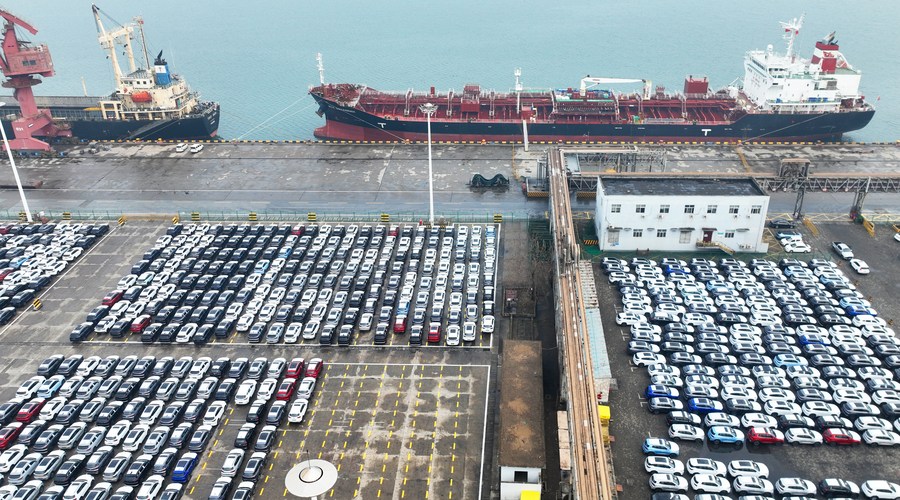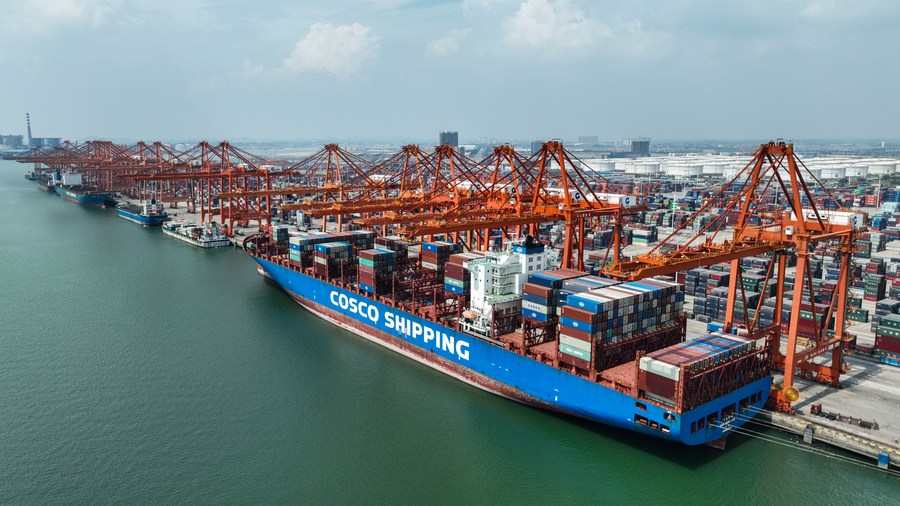
Vehicles waiting to be exported at a port in Lianyungang, east China's Jiangsu Province, January 13, 2023. /Xinhua
Vehicles waiting to be exported at a port in Lianyungang, east China's Jiangsu Province, January 13, 2023. /Xinhua
Editor's note: Wang Huiyao is the president of the Center for China and Globalization (CCG). The article reflects the author's opinions and not necessarily the views of CGTN.
On January 17, Chinese Vice Premier Liu He delivered a speech at the World Economic Forum Annual Meeting 2023 in Davos. He reaffirmed China's commitment to all-round opening-up, international cooperation with other countries for world economic stability and development.
Since the reform and opening up in 1978, China's use of foreign capital has grown steadily, with the size of foreign investment ranking first among developing countries for many years. According to official data, in the first 11 months of 2022, China's actual use of foreign investment reached nearly 1.16 trillion Chinese yuan ($170.62 billion), up 9.9 percent year-on-year on a comparable basis, already higher than the whole year of 2021.
On the basis of "retaining the existing foreign investors and bringing in new foreign investors," China has achieved remarkable results in improving the quality of foreign investment. The introduction of foreign investment has contributed to the development of key areas.
From January to November of 2022, the actual use of foreign capital in the high-tech manufacturing sector expanded by 58.8 percent, while that in the high-tech service sector rose by 23.5 percent, becoming the "main engine" for attracting foreign investment.
Secondly, in the first 11 months of 2022, the sources of foreign investment became more diversified. The actual investment from South Korea, Germany, the UK and Japan increased by 122.1 percent, 52.6 percent, 33.1 percent and 26.6 percent, respectively, year-on-year. Thirdly, the regional distribution of foreign investment got more balanced. Central and western China have become more attractive to foreign investors, with foreign capital inflows growing at 28.6 percent and 24.6 percent, respectively.
As the world economy was buffeted by geopolitics, trade protectionism and COVID-19, China has stood steadfast in ramping up both the quantity and quality of foreign investment, and achieved trend-bucking foreign investment growth in 2022. This would not have been possible without China's sustained efforts to provide easy market access for foreign investors and improve the business environment for foreign-funded companies to thrive in China.
In terms of expanding market access for foreign investors, China has reduced the foreign investment negative list for its free trade zones (FTZ) multiple times, removing some restrictions on foreign investment. The new list of the national version and that of the FTZ version cut down the number of items restricted to foreign investors to just 31 and 27, respectively.
Major opening-up measures were rolled out in the fields of manufacturing, mining, agriculture, and finance to lure in more foreign-funded companies to operate in China. The total number of items contained in the 2022 Catalogue of Encouraged Industries for Foreign Investment has increased by nearly 20 percent from the 2020 version. The new catalogue expands the scope of encouraged industries for foreign investment and guides foreign capital into key areas such as manufacturing and production-oriented service industries, as well as key regions such as central, western and northeast China.
In terms of optimizing the investment and business environment, China has scrapped regulations and guidelines that run counter to the Foreign Investment Law over the past six years, and has promoted the establishment, revision and abolition of more than 500 documents to provide a level playing field for foreign-funded companies.
At the end of 2022, the National People's Congress (NPC) passed an amendment to China's Foreign Trade Law, which abolished the requirement for filing and registration procedures for foreign trade operators. Companies do not need to register as foreign trade operators and can go directly to the Customs for import and export procedures with their business licenses.
China is also aligning itself with higher standards. The Regional Comprehensive Economic Partnership (RCEP) entered into force at the beginning of 2022. China is seeking to join the Comprehensive and Progressive Agreement for Trans-Pacific Partnership (CPTPP) and Digital Economy Partnership Agreement (DEPA). Moreover, China is engaged in the negotiation and upgrading of several free trade agreements.
In 2023, facing the global economic downturn and resurgence of protectionism, it is crucial for China to promote high-level opening up to the outside world. China will implement various policy measures to stabilize foreign investment.

Ships berthed at the container wharf of Qinzhou Port in Qinzhou, south China's Guangxi Zhuang Autonomous Region, September 13, 2022. /Xinhua
Ships berthed at the container wharf of Qinzhou Port in Qinzhou, south China's Guangxi Zhuang Autonomous Region, September 13, 2022. /Xinhua
One is to promote major foreign investment projects. The first five batches of major foreign investment projects have been materializing at an accelerating speed. The government has combed through the foreign investment projects in the pipeline across China. A new batch of major foreign investment projects with driving effects on the broader economy will be launched in due course.
The second is to step up service provision to foreign investors. Promotional events for international industrial and investment cooperation will be organized to build a platform for multinationals to invest in China and for local governments to attract investment.
The third is to keep optimizing the business environment for foreign investors. The Foreign Investment Law will be implemented to ensure that all policies apply equally to both domestic and foreign-funded companies and that the latter can enjoy national treatment in practice. China will remove restrictions outside the negative list of foreign investment access, strengthen the protection of intellectual property rights, and build a market-oriented and law-based business environment open to global players.
China has prepared for foreign companies to come to China and upgrading its business environment. Likewise, foreign-fund companies have remained bullish on China's economic development, and are willing to take root in the Chinese market and contribute to the growth of the Chinese and global economy.
According to reports from various chambers of commerce in China, over 70 percent of German companies, over 60 percent of American companies and most British companies plan to increase their investment in China, and many well-known multinationals are increasing their presence in the around low-carbon sectors.
As stated by the China Belt and Road Initiative Trade and Investment Report 2022, from 2013 to 2021, 32,000 companies were invested and established in China by countries along the Belt and Road, with a cumulative direct investment of $71.15 billion. In 2021, the actual investment in China by countries along the Belt and Road was $11.25 billion, an increase of 36 percent year-on-year.
With China's economy involved in the globalization process and deepening of reform and opening-up policies, China has integrated into the global value chain, industrial chain and supply chain system. China's global-oriented system is jointly built by domestic and foreign-funded companies.
China upholds the market opening and embraces mutually beneficial cooperation. Investors from all over the world can share in the opportunities of China's development and boosting economic growth of the Chinese and world economy.
(If you want to contribute and have specific expertise, please contact us at opinions@cgtn.com. Follow @thouse_opinions on Twitter to discover the latest commentaries in the CGTN Opinion Section.)